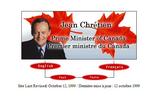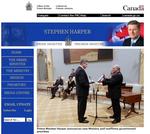The Prime Ministerial website is accessible at http://pm.gc.ca and besides the changing of the guard over the years (from Chretien to Martin to Harper), the website has not really changed that much and still remains quite simplistic in its presentation and web standards. Click each image to enlarge.
The current version of the website, which features our new Prime Minister Stephen Harper, is still quite antiquated by web standards. For example, the buttons on the left use simple javascript rollover functions instead of CSS.
Also, the website asks the user to submit their email address to subscribe for ’email updates’. Of course, email updates are still useful to many, however, enabling web 2.0 features on the website (especially RSS) would extend the website’s usefulness to many, many more users on a variety of platforms. Further, the Conservatives have been quite succesful in featuring podcasts on their main website at www.conservative.ca and on their youth-themed website at www.cpcenergy.ca. Mr. Harper’s speeches could be featured as audio or video podcasts on the PMO website.
Prime Minister Stephen Harper campaigned on a platform of changing the way government works for all Canadians. A new, refreshed and modern web presentation of the Prime Ministerial website could help signal the Conservative drive for renewal.
UPDATE: www.stephenharper.ca goes to the PM’s official website. Years ago, I remember hearing about a news story in which a reporter asked then Prime Minister Jean Chretien what he thought about not owning his own domain name (it was snapped up by a cybersquatter). Of course, Chretien didn’t have a clue what the reporter was talking about.







 A Conservative government under the leadership of Stephen Harper will reduce the GST from 7% to 6% immediately and then to 5% within five years.
A Conservative government under the leadership of Stephen Harper will reduce the GST from 7% to 6% immediately and then to 5% within five years.